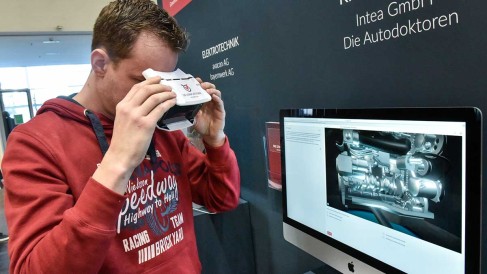Vocational Education / myQ-Qualification
What can I expect in the theme area of vocational training/myQ qualification at didacta?
Vocational preparation, professional training and continuing professional education – at didacta, teaching professionals, and people with an interest in education and who are eager to learn new things will find exciting concepts, the latest learning materials and innovative approaches. The exchange with colleagues, service providers and representatives from business and politics also provide the opportunity to share experiences and learn about the wide range of adult education offerings. The exhibitors, guests, speakers and experts at didacta will also answer interesting questions related to the field of education:
- What innovations and solutions does the market offer?
- What are the trends and developments taking place right now?
- What lessons have we learned with regard to the training market during the pandemic?
- How is the market for action-based coaching developing?
- What is the impact of lifelong learning on the education industry?
- What is the current status of the digitalisation of education in the context of vocational training?
The myQ area also offers many opportunities for lifelong learning. Featured here are institutes for continuing education, coaches and service providers.
For whom is didacta especially interesting?
As a trade fair event for the education sector, didacta is primarily geared to educators in the broadest sense, including:
- Teachers
- Instructors
- Personnel managers
- Coaches & trainers
- Education service providers
- Anyone who is interested in education, are thirsty for knowledge and want to experience trends and topics in the education industry first hand

What is part of vocational training?
Every career has a starting point – however, not every path is ready-made. Unless pursuing a course of study, most young people opt for initial vocational education and training after school. The possibilities are as varied as the choice of profession itself. They include the dual training system and full-time school-based training programs as well as all forms of vocational preparation and continuing professional education all the way to technical degree programmes.
What is the difference between initial training, advanced training and continuing training?
Vocational education and training starts after school. Of course, the candidate still needs to meet the admission requirements. Students gain theoretical and practical experience during this training at the beginning of their work life. In dual training or dual study, the programmes also have an academic component that the trainees have to complete successfully. The goal is to obtain the qualifications required for the desired profession.
While initial training starts from the ground up, advanced training builds on already acquired experience. In this case, the vocational training is expanded to include new skill sets. Proof of successfully completed advanced training includes certificates, diplomas and similar formal credentials. In general, employers do not have to provide advanced training opportunities. However, offering continuing professional development can certainly serve as an incentive for employees and potential candidates.
In contrast to advanced training, no prior professional experience is required for continuing education. Some companies offer individual continuing education programs. Continuing professional development can help to strengthen new internal structures in a company or even open up new ones. Personal continuing education is when an individual wants to upskill themselves in a professional context. Continuing education is also often the path to a new profession when changing careers.
What is vocational training? Are there any differences?
Vocational education and training can be done in various ways. The traditional route is to attend a vocational school. While the number of dual training concepts has increased in recent years, this does not include all professions. The type of vocational training is usually specified by the training company. On the job training is often the practical way to integrate trainees into the day-to-day operations of the company and teach important work processes. The theoretical part is added by an outside body and can be done in blocks or on specific vocational school days during the work week. The duration of vocational training is also not fixed. Depending on the specifications, content and skills of the student, the training can last between one and three years. The training period includes examinations and documentation of the vocational activities.
What will the vocational training of the future look like?
We are already seeing some of the trends and developments in education today. Digitalisation also does not stop when it comes to vocational training. Modern vocational training programmes are more in demand than ever in order to meet the needs of the rapidly developing labour market. Individual solutions, like certified training courses, are on the rise. Strengthening and developing skills in a targeted manner require new structures, which are becoming increasingly important in the professional context. The principle of lifelong learning represents a new era for the educational sector by gradually challenging, expanding and modernising the existing vocational training system.
Particularly in terms of technological advancement, tools and digital infrastructures are increasingly keeping up with the educational demands of the times. Innovation drivers, start-ups and established companies are presenting smart solutions at didacta using state-of-the-art software and hardware. The expectation is for the educational requirements of vocational training to be brought into alignment with the practice of remote working that has recently been established in society.




